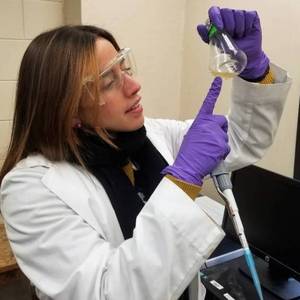LSU grad student uses E. coli to create biodiesel feedstock

Photo: Louisiana State University
February 21, 2019
BY Louisiana State University
Tatiana Mello of Piracicaba, Brazil, a mechanical engineering graduate student at Louisiana State University, is currently working on genetically engineering and optimizing E. coli bacteria to produce bioproducts, like biodiesel, in a cost-effective manner. This undertaking has garnered the attention of many in the engineering and biology fields and has also given her the opportunity to speak about her research at the recent National Biodiesel Conference & Expo in San Diego.
Mello proposes using E. coli bacteria to expand biodiesel production by creating a new type of feedstock.
“The main feedstocks used in the U.S. for biodiesel are soybean and [distillers] corn oil,” she said. “The actual production is enough to feed us, but you have the surplus that nobody knew what to do with, so biodiesel was created. This market is growing and growing. They expect within a few decades, the surplus won’t be enough to produce biodiesel. E. coli is cheap and abundant, and you can just genetically modify it to fulfill this need.”
Mello’s main goal is to create Malonyl-CoA bioproducts, such as biodiesel, plastics, polymers and pharmaceuticals. Malonyl-CoA is found in bacteria from humans and has important roles in regulating fatty acid metabolism and food intake; it’s also an attractive target for drug discovery.
“Malonyl-CoA maximization is the topic of my research because it’s a precursor for so many things,” she said.
Advertisement
Mello, who has worked on this project for two years, had the privilege of presenting her project at the National Biodiesel Conference & Expo in San Diego last month. Only 12 university-level science majors in the country who are interested in learning about the biodiesel industry receive travel scholarships to attend. However, only four of those students are asked to present their research.
Mello did so as part of the Next Generation Scientists for Biodiesel, of which she is a member. She said attending the conference not only impacted her career and research, but also her understanding of the biodiesel industry.
“I was opened up to a new world after the misconception about the food industry and the biofuel industry competing for cropland was demystified,” she said. “The many new concepts, regulations and issues presented during the fast-paced event prepared me much better for the entire biodiesel business.”
After earning her bachelor’s degree in biological sciences at the University of Campinas (Unicamp) in São Paulo, Mello decided she needed one more degree in order to apply her scientific knowledge.
Advertisement
“First I got into biology because I was all about studying life,” she said. “It fascinated me. When I was finishing my biology degree, I realized I couldn’t apply anything to what I was studying. Those were the engineers. I needed bioreactors and machinery. So, I decided to get an engineering degree.”
Mello stayed at Unicamp, where she earned her mechanical engineering degree and then began working for Caterpillar Inc. in Brazil.
“While there, I realized I wanted to combine my two bachelor degrees,” Mello said.
She connected with LSU mechanical engineering professor Marcio de Queiroz, who is also from Brazil and now serves as her advisor. She also has co-advisors, such as LSU biological sciences professor Grover Waldrop, and says they all work together and have submitted a patent on her project.
Mello is set to graduate from LSU in May and plans to stay in southeast Louisiana, hopefully finding a job in the Baton Rouge area. Of course, it all depends on which company will be open to her new idea.
“We have this method, and it’s working, but we need industry partners to scale it up,” she said.
Related Stories
China’s exports of used cooking oil (UCO) reached a record high in 2024 but fell sharply in December after the Chinese government eliminated the 13% export tax rebate for UCO, according to a report filed with the USDA.
Ash Creek Renewables expands global reach with exclusive camelina seed licenses and 'Forks and Fuels' initiative
Ash Creek Renewables, a portfolio company of Tailwater Capital LLC, on March 20 announced it has secured exclusive licensing rights from Montana State University for a new high-performance camelina seed variety.
Clean Fuels Alliance America on March 18 submitted comments supporting USDA on its Technical Guidelines for Climate-Smart Agriculture Crops Used as Biofuel Feedstocks Interim Rule and incorporation of USDA FD-CIC.
Japan-based Cosmo Oil Co. Ltd. on March 6 announced that construction is complete on a SAF located within the company’s existing Sakai refinery. The facility, operated by Saffaire Sky Energy LLC, is expected to begin supplying SAF in April.
Preliminary agenda announced for 2025 International Fuel Ethanol Workshop & Expo
Ethanol Producer Magazine announced this week the preliminary agenda for the 2025 International Fuel Ethanol Workshop & Expo (FEW) taking place June 9-11, 2025 at the CHI Health Center in Omaha, Nebraska.
Upcoming Events










